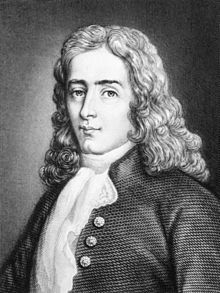René Antoine Ferchault de Réaumur
| Réaumur | |
|---|---|
 |
|
| Born | 28 February 1683 La Rochelle |
| Died | 17 October 1757 (aged 74) Saint-Julien-du-Terroux |
| Nationality | French |
| Fields | Entomology |
| Known for | Temperature scale named for him |
René Antoine Ferchault de Réaumur (French: [ʁe.o.myːʁ]; 28 February 1683, La Rochelle – 17 October 1757, Saint-Julien-du-Terroux) was a French scientist who contributed to many different fields, especially the study of insects. He introduced the Réaumur temperature scale.
Réaumur was born in a prominent La Rochelle family and educated in Paris. He learned philosophy in the Jesuits' college at Poitiers, and in 1699 went to Bourges to study civil law and mathematics under the charge of an uncle, canon of La Sainte-Chapelle. In 1703 he came to Paris, where he continued the study of mathematics and physics, and in 1708, aged only twenty-four, was nominated by Pierre Varignon (who taught him mathematics) and elected a member of the Académie des Sciences. From this time onwards for nearly half a century hardly a year passed in which the Mémoires de l'Académie did not contain at least one paper by Réaumur.
At first, his attention was occupied by mathematical studies, especially in geometry. In 1710, he was named the chief editor of the Descriptions of the Arts and Trades, a major government project which resulted in the establishment of manufactures new to France and the revival of neglected industries. For discoveries regarding iron and steel he was awarded a pension of 12,000 livres; but, content with his ample private income, he requested that the money should go to the Académie des Sciences for the furtherance of experiments on improved industrial processes. In 1731 he became interested in meteorology, and invented the thermometer scale which bears his name: the Réaumur. In 1735, for family reasons, he accepted the post of commander and intendant of the royal and military Order of Saint Louis; he discharged his duties with scrupulous attention, but refused the pay. He took great delight in the systematic study of natural history. His friends often called him "the Pliny of the 18th century".
...
Wikipedia
